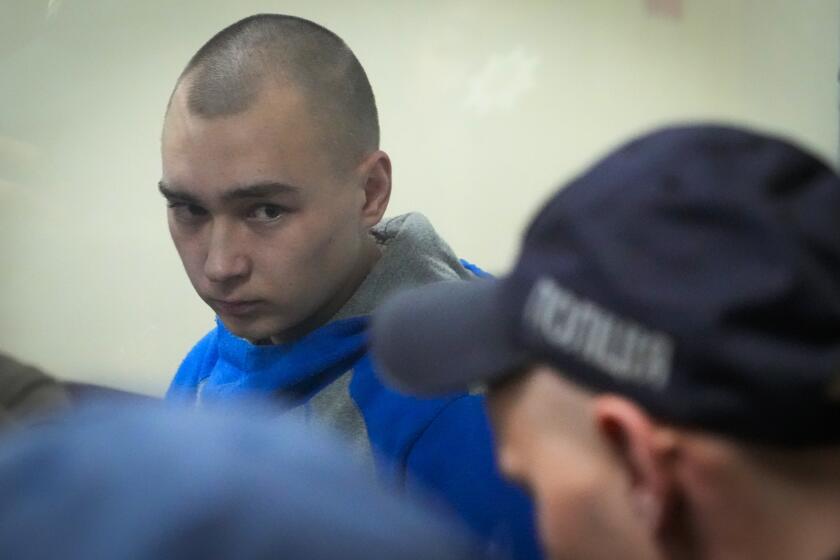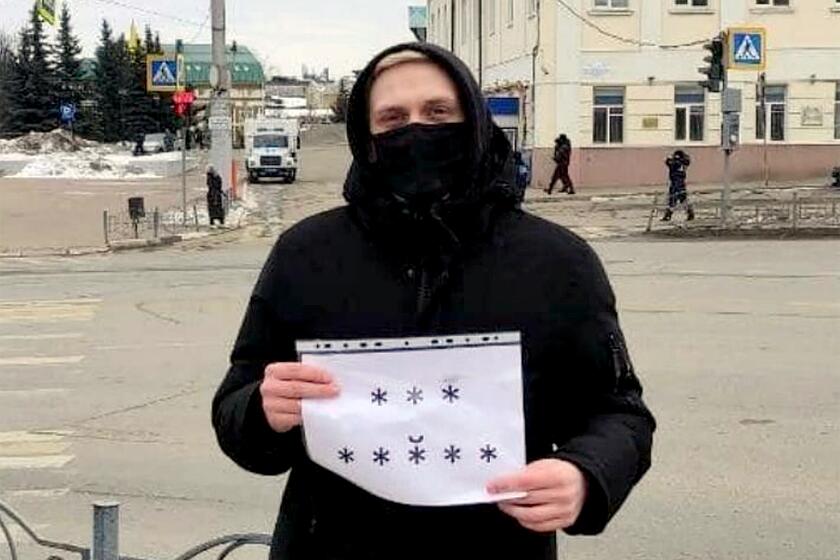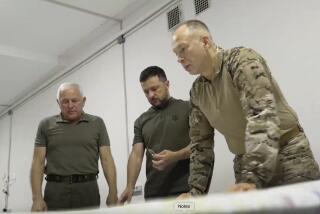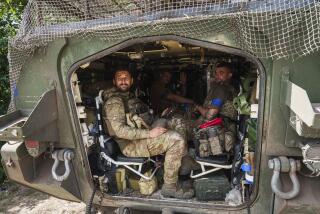Ukraine says it’s holding off Russia’s intensified thrust in the east
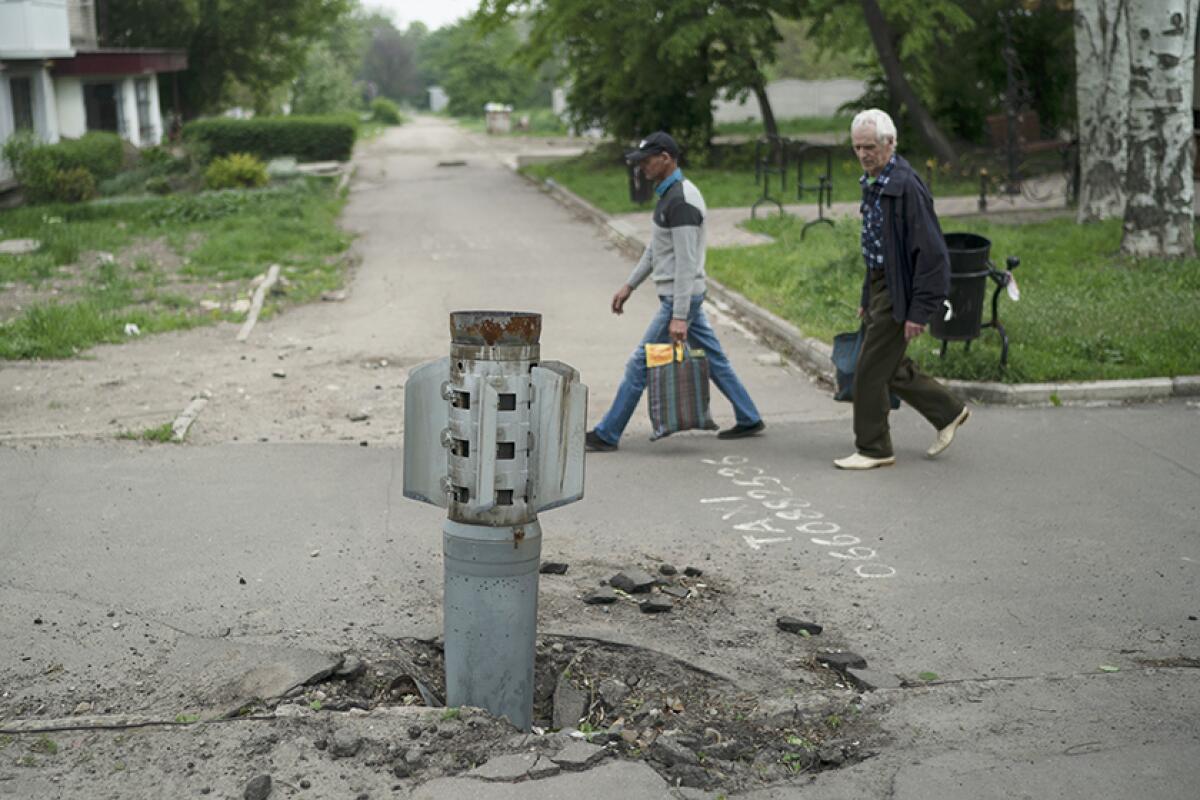
KYIV, Ukraine — A day after President Biden signed a sweeping bill to support Ukraine with $40 billion more in military and humanitarian aid, Russian forces intensified their efforts to encircle and capture a key city in the east and Ukrainian President Volodymyr Zelensky pleaded for additional weapons.
In a video address, Zelensky said the grinding military panorama
in the heavily contested eastern Donbas region “is extremely difficult,” noting that Russian forces continue to mass around the cities of Severodonetsk and Slovyansk, strategic points that serve as the base for the Ukrainian defense of the Donbas.
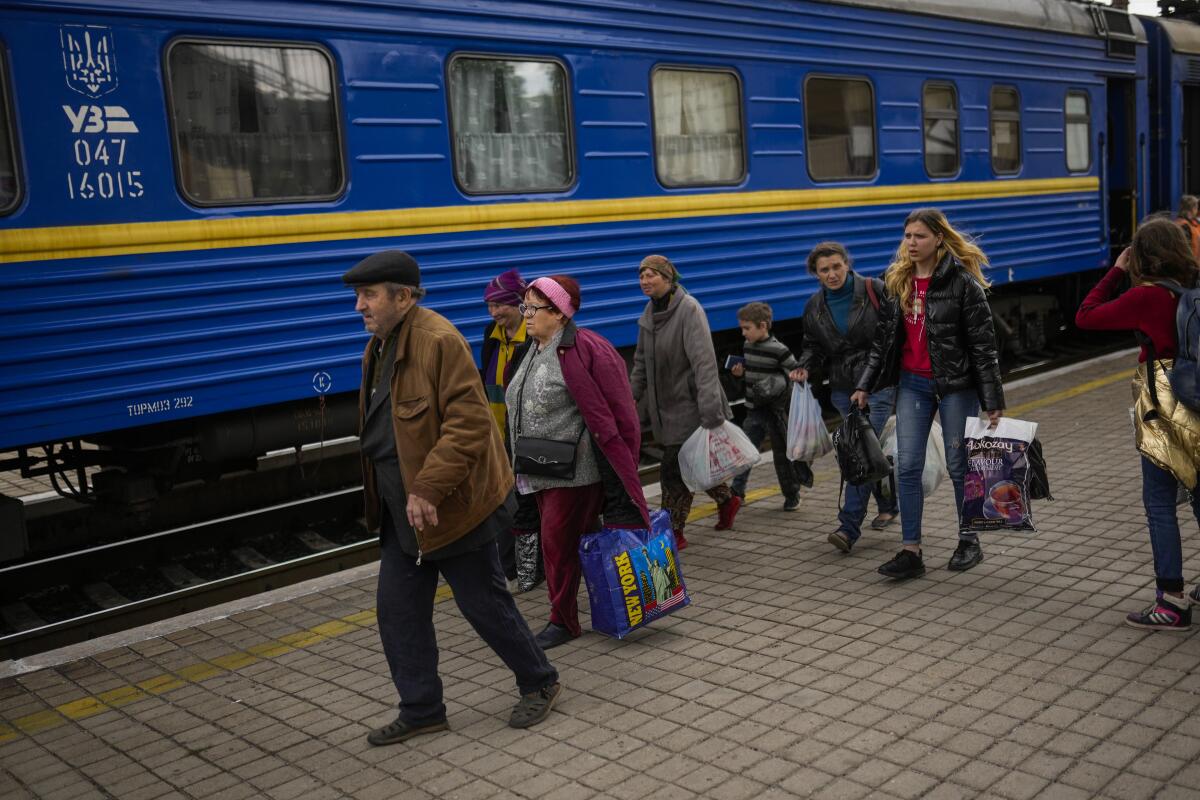
He described a war of attrition, with his military’s strategy to try to wear down and frustrate Russian forces as they continue to pound Ukrainian positions.
The president said the military situation “had not changed significantly,” which he called a positive development, considering Moscow’s vast military capabilities.
“Actually, the fact that we are able to say this on the 87th day of a full-scale war against Russia is good news,” Zelensky said. “Russia has sent virtually all its resources to destroy us.”
The effects of Russia’s invasion of Ukraine have been devastating for families, including those who have seen their prospective adoptions put on hold.
Zelensky thanked Biden, who on Saturday signed one of the biggest foreign assistance packages in recent U.S. history. But Zelensky said additional weaponry would be required to open transport routes and ports that have been blocked by the Russians, actions that have fueled grain shortages and inflation globally.
His call for further aid highlights the unremitting nature of a conflict that began Feb. 24, when Russian troops invaded Ukrainian territory on various fronts. The Russian expectation of a quick victory evaporated as Ukrainian forces put up stiff resistance, forcing Moscow to abandon its plan to seize the capital, Kyiv.
Russian forces eventually retreated from Kyiv in early April and redirected efforts toward southern Ukraine and the Donbas, Ukraine’s coal-producing, traditional industrial heartland. The Donbas is composed of the provinces of Luhansk and Donetsk.
Since 2014, pro-Russia separatists have controlled large swaths of the Donbas region. Moscow’s forces are seeking to expand control to the entire Donbas.
On Sunday, Polish President Andrzej Duda appeared before Ukraine’s parliament in Kyiv and criticized recent remarks by some European leaders that Ukraine should consider a peace deal that would require it to cede some parts of the Donbas region to Russia.
Duda, who thanked Ukraine for leading the fight against “Russian imperialism,” said it would be a “huge blow not only for Ukraine, but also for the entire Western world,” if even a sliver of the country was lost in a deal.
Neighboring Poland has been a staunch supporter of Ukraine, sending weapons, housing millions of refugees who have fled the fighting and promoting Ukraine’s efforts to join the European Union.
As Duda spoke in the capital, the Ukrainian Defense Ministry said that Russian troops “continue to advance in the east” while the forces of Belarus — a close Russian ally just north of Ukraine — “are conducting intensified reconnaissance on the border with Ukraine.”
Ukrainian forces repelled nine enemy attacks during the previous 24 hours in the Donbas, the military reported.
A day earlier, Luhansk Gov. Serhiy Haidai said that Russian troops were throwing “all their forces and efforts” into assaulting Severodonetsk. The aim was to cut off the main supply route to the key city, he said.
A Russian soldier facing the first war crimes trial since the start of the Ukraine war says he fatally shot a civilian on orders from two officers.
“The Russians are destroying Severodonetsk ... The enemy’s plans are to surround the area or turn it into a fire,” Haidai said in a statement on Telegram.
A Russian breakthrough in Luhansk would enable an attack on nearby Donetsk and Kharkiv provinces, he added.
Haidai said the Russians had destroyed a bridge between Severodonetsk and Lysychansk, its twin city across the Seversky Donets River. The bridge’s destruction will complicate efforts to bring reinforcements to Severodonetsk, he said.
Russia is continuing to press its offensive in the east after claiming its biggest victory in its almost-three-month assault: the full capture of the sprawling Azovstal steelworks plant in the coastal city of Mariupol. The facility’s labyrinthine network of pipes and tunnels became the site of Ukraine’s last stand in Mariupol.
The battle for Mariupol came to dramatize the violence and intensity of the Ukrainian conflict. Much of Mariupol is in ruins and Ukrainian authorities say only about 100,000 of a pre-war population of more than 400,000 remain.
Russia said it captured 2,439 Ukrainian troops when it took the metal-works plants. The fate of the captured fighters is unclear.
Although Kyiv said it would bring back its troops via prisoner exchanges, the Kremlin has yet to comment on their fate. In recent days, Russian lawmakers have called for prison terms and even capital punishment for members of the Azov regiment, a far-right Ukrainian military unit with neo-Nazi roots whose fighters emerged as the Azovstal plant’s most stubborn defenders. The history of the group has been seized on by the Kremlin to claim it is fighting “Nazis” in Ukraine, an assertion dismissed as ridiculous by the Ukrainian government.
As Russia fines and arrests citizens for speaking out against the war in Ukraine, people are turning to coded messages.
Mariupol has been a target of Russia’s invasion virtually from the start of the war. As much of the city fell into Russian hands, an assortment of Ukrainian troops and civilians bunkered in the massive plant even as their adversaries maintained a relentless siege, along with continuous bombardment. Women, children and elderly people were first bused out before Ukrainian authorities ordered the remaining troops to surrender. The full death toll of civilians in the Mariupol siege is still unknown, but Ukraine says it could be many thousands.
The Institute for the Study of War, a Washington think tank that tracks conflicts, said in a new report that Russian forces were working to remove mines from around the plant and predicted that “the information space in Mariupol will likely become increasingly restricted in the coming weeks as Russian forces shift their attention from the capture of Azovstal to consolidating occupational control over the city.”
For Russia, the capture of Mariupol offers the prospect of a land bridge between pro-Russia territory in the Donbas and the Crimea, which was seized by Russia in 2014. Its control of Mariupol is a major victory for Russian President Vladimir Putin. But Russia seems intent on pushing for further territorial gains in the Donbas, signaling a prolonged land battle involving tanks, artillery, aircraft and ground forces in the broad eastern stretches of Ukraine.
McDonnell reported from Kyiv, Bulos from Beirut and Linthicum from Mexico City.
More to Read
Sign up for Essential California
The most important California stories and recommendations in your inbox every morning.
You may occasionally receive promotional content from the Los Angeles Times.

